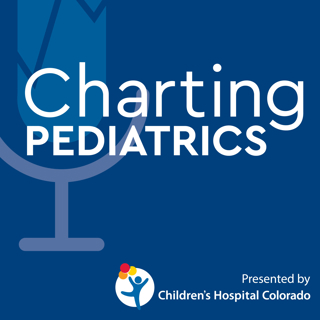
Vaping Associated Pulmonary Injury (S3:E6)
Providers may have seen the reports from around the country of growing associations between vaping and more acute, severe lung injury; this is being called Vaping Associated Pulmonary Injury (VAPI). The CDC is involved and many states are now reporting vaping-associated pulmonary cases. In today’s special episode we are discussing VAPI and how to diagnosis, report and treat; our expert guest is Robin Deterding, MD, Chief of Pediatric Pulmonary Medicine at Children’s Hospital Colorado and Professor of Pediatrics at the University of Colorado School of Medicine. Children’s Colorado is notifying providers that may see these patients. It is very unclear what is happening, but there is a severe, noninfectious respiratory failure spectrum with an ARDS-like picture. If you know of a past or current patient case that fits the below criteria please contact the Pulmonary Team via OneCall, 720-777-3999. Additional Resources: What Parents Need to Know About Teen Vaping Reporting suspected cases to the CDC Report suspected cases to CDPHE’s Disease Reporting Line, 303-692-2700 or 303-370-9395 (after hours). This includes potential cases who presented since June 1, 2019. CDPHE personnel will conduct a medical record review and contact the patients to administer a thorough investigation questionnaire. Charting Pediatrics Podcast: Teen E-Cigarette Use and the Vaping Epidemic (S2:E23)
5 Syys 201920min

Recurrent Headache in Pediatrics (S3:E5)
Nearly 60 percent of children report having headaches; by the age of 18, that number increases to 90 percent. Recurrent, severe headaches also are common in this population. In the United States, one study reported that approximately 20 percent of children aged 4 to 18 years report having had notable recurrent headaches (including migraine) in the past 12 months. In today’s episode we are talk with Mario Coleman, MD about the diagnosis and management of reoccurring headaches in children and adolescents. Dr. Coleman is a Pediatric Neurologist and an Assistant Professor of Pediatrics and Neurology at the University of Colorado School of Medicine.
3 Syys 201922min

Renal Tubular Acidosis, RTA (S3:E4)
Renal tubular acidosis, or RTA, refers to a group of disorders characterized by defective renal acid-base regulation. The capacity for normal urinary acidification is impaired, resulting in net acid retention and hyperchloremic metabolic acidosis. In this episode, Danielle Soranno, MD reviews basic mechanisms of the disease that are important for diagnosis and management of RTA in your patients. Dr. Soranno is an Associate Professor of Pediatrics, Bioengineering, and Medicine at the University of Colorado School of Medicine and a Pediatric Nephrologist at Children’s Hospital Colorado. Tell us what you thought about today's episode or make a suggestion for a future episode! Send a tweet to Dr. Brent, @AlisonBrentMD
27 Elo 201932min

Diagnosis and Management of Hirschsprung Disease (S3:E3)
Hirschsprung disease occurs in approximately one in 5,000 newborns. Despite advances in the diagnosis and management of the disease, patients remain at risk for long-term gastrointestinal morbidity, including obstructive symptoms, fecal incontinence, and enterocolitis, with negative implications on quality of life. In today’s episode we are talking with Luis De la Torre, MD, to unpack the diagnosis and management of Hirschsprung disease and discuss new treatments being explored. Dr. De la Torre is a Visiting Associate Professor of Surgery at the University of Colorado School of Medicine and the newest member of our International Center for Colorectal and Urogenital Care team at Children’s Hospital Colorado. We'd love to hear from you! Share your thoughts about today's episode or ideas for a future topic by emailing the Charting Pediatrics host team.
20 Elo 201926min

Undescended and Retractile Testis (S3:E2)
Cryptorchidism or undescended testis (UDT) is one of the most common pediatric disorders of the male endocrine glands and the most common genital disorder identified at birth. The main reasons for treatment of cryptorchidism include increased risks of impairment of fertility potential, testicular malignancy, torsion and/or associated inguinal hernia. In today’s episode we will talk with Brian Caldwell, MD about the difference in presentation of undescended vs retractile testis, approaches to treatment and long-term prognosis for these patients. Dr. Caldwell is a Pediatric Urologist from the Children's Hospital Colorado, Colorado Springs faculty and is an associate professor of surgery and urology at the University of Colorado School of Medicine. Let us know your suggestion for a future podcast topic. Dr. Caldwell can be reached through OneCall, 720-777-3999.
13 Elo 201922min

Through the Lens of the CBC: Bleeding Disorders in Pediatrics (S3:E1)
Welcome to Season 3 of Charting Pediatrics! In today's season kick-off show we discuss the most common bleeding disorders in pediatrics through the lens of the CBC with Tazio Nakano, MD. Dr. Nakano is Medical Director of the Vascular Malformation and Tumor Center at Children's Hospital Colorado and is Assistant Professor of Pediatrics of Hematology/Oncology and Bone Marrow Transplant at the University of Colorado School of Medicine. Thank you to each of you who cast a vote of support for Children's Hospital Colorado in the 14th Annual People's Choice Podcast Award Nominations! Send Dr. Nicklas at tweet and let him know what you think about today's episode. Let us know if you have a suggestion for a future podcast topic.
6 Elo 201936min

14th Annual People’s Choice Podcast Award Nominations
Charting Pediatrics Podcast has received initial nomination eligibility for the 14th Annual People’s Choice Podcast Award in the Science and Medicine category! Now we need your support – visit https://www.podcastawards.com/app/signup to help Charting Pediatrics move to the next stage of listener voting! You will have to create an account to vote – then visit the nomination page and scroll to the Science & Medicine Category and select Charting Pediatrics. You can only nominate once and support nominations close on July 31. Finalists will be announced on August 10. Thank you for your ongoing support!
30 Heinä 20191min

School Anxiety and School Refusal in Kids (S1:E25 Rebroadcast)
Our guest for this episode is Jessica Malmberg, PhD, the Clinical Director of Outpatient Services at the Pediatric Mental Health Institute and assistant professor of child psychiatry at CU School of Medicine. Dr. Malmberg talks us through a common behavioral issues of school-aged children – school refusal – and provides insights, advice and tools to help prevent, manage and understand this behavior. In this episode: Outlining and identifying the underlying symptoms and signs associated with a child refusing to attend school How primary care providers (PCPs) can assist parents who are experiencing guilt Identifying the four most common reasons that children refuse to go to school Exploring the effects of social media on children's behavior when it comes to school refusal How a PCP should approach treatment of school refusal The recommended frequency of follow-up care for kids who are refusing to go to school The importance of connecting parents to community-based resources Preventative practices parents can set up in the home to prevent this behavioral issue What an excellent prognosis looks like for children experiencing school refusal When it's time to refer to a mental health professional PCPs in the Denver Metro Area can refer patients to the Children's Hospital Colorado Outpatient Psychiatry Clinic or to a local community mental health center Resources for dealing with school refusal: School Refusal: Information for Educators (.pdf) from the National Association for School Psychologists School Refusal in Children and Adolescents from American Family Physician The Functional Assessment of School Refusal Behavior Effective Child Therapy Division 53 of the Society of Clinical Child & Adolescent Psychology website School Refusal from the American Academy of Child & Adolescent Psychiatry
30 Heinä 201929min





















